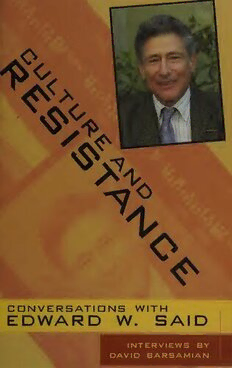
Culture and Resistance: Conversations with Edward W. Said PDF
Preview Culture and Resistance: Conversations with Edward W. Said
CONVERSATIONS WITH EDWARD W. SAID INTERVIEWS BY DAVID BARSAMIAN Culture and Resistance Culture and Resistance A Conversations with Edward W. Said David Barsamian and Edward W. Said South End Press Cambridge, Massachusetts s Copyright © 2003 by Edward W. Said and David Barsamian. Any properly footnoted quotation of up to 500 sequential words may be used without permission, as long as the total number of words quoted does not exceed 2,000. For longer quotations or for a greater number of total words, please write to South End Press for permission. Cover design by Ellen P. Shapiro Library of Congress Cataloging-in-Publication Data Said, Edward W. Culture and resistance : conversations with Edward W. Said / David Barsamian and Edward W. Said, p. cm. Includes bibliographical references (p.) and index. ISBN 0-89608-671-2 ISBN 0-89608-670-4 (pbk. : alk. paper) 1. Said, Edward W.—Interviews. 2. Intellectuals—United States—Interviews. 3. Palestinian Americans—Interviews. 4. Arab-Israeli Conflict. 5. Arab-Israeli conflict—1993—Peace. 6. Al-Aqsa Intifada, 2000- 7. Politics and culture. I. Barsamian, David. II. Tide. CB18.S25A5 2003 956.05’3—dc21 2003042371 South End Press, 7 Brookline Street, #1 Cambridge, MA 02139-4146 www.southendpress.org Printed in Canada 07 06 05 04 03 12 3 4 5 6 Table of Contents Acknowledgments vii Introduction by David Barsamian ix 1 A One-State Solution 1 2 Intifada 2000: The Palestinian Uprising 31 3 What They Want Is My Silence 71 4 Origins of Terrorism 103 5 A Palestinian Perspective on the Conflict with Israel 133 6 At the Rendevous of Victory 159 Maps 197 Selected Bibliography 211 Index 215 About the Authors 227 Alternative Radio’s Audio Archives 229 Acknowledgments Excerpts of these interviews appeared originally in The Pro gressive, Z Magazine, Third World Resurgence, and International Socialist Review. All the interviews were broadcast on KGNU in Boulder, Colorado, one of the premier community radio stations in the United States. It has been my good fortune to be associated with it since it first went on the air in 1978. Two of the interviews were nationally broadcast on Alternative Radio and one on Making Contact. Except for chapters 1, 4 and 5, the interviews were all done in person. Anthony Amove is an outstanding editor and comrade. Thanks to the Lannan Foundation in Santa Fe for its support. Thanks to Dr. Mahdi Abdul Hadi, chairman of the Palestinian Aca demic Society for the Study of International Affairs (PASSIA) in Jerusalem for the maps and Rebecca Kandel for the photos used here. My special gratitude to Edward W. Said for .making himself available. I count my time with him among my most rewarding experiences. Introduction “I have been unable,” Edward W. Said writes, “to live an un committed or suspended life: I have not hesitated to declare my affiliation with an extremely unpopular cause.”1 The 1967 Arab-Israeli war stirred him to political activism. A year later, his first political essay, “The Arab Portrayed,” ap peared. When Israeli Prime Minister Golda Meir infamously declared in 1969, “It was not as though there was a Palestin ian people__ They did not exist,” Said decided to take on “the slightly preposterous challenge of disproving her, of be ginning to articulate a history of loss and dispossession that had to be extricated, minute by minute, word by word, inch by inch,” he writes.2 For many years, he has been the main spokesman for the Palestinian cause in the United States. “Palestine,” he says, “is a thankless cause ... [Y]ou get nothing back but opprobrium, abuse, and ostracism__How many friends avoid the subject? How many colleagues want none of Palestine’s controversy? How many bienpensant liber als have time for Bosnia and Chechnya and Somalia and Rwanda and South Africa and Nicaragua and Vietnam and
